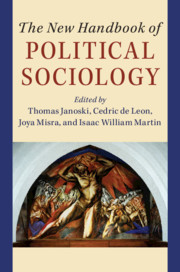Book contents
- The New Handbook of Political Sociology
- The New Handbook of Political Sociology
- Copyright page
- Dedication
- Contents
- Tables
- Figures
- Contributors
- Acknowledgments
- Introduction
- I Theories of Political Sociology
- 1 Power
- 2 Conflict Theories in Political Sociology
- 3 The Promise of Field Theory for the Study of Political Institutions
- 4 Culture in Politics and Politics in Culture
- 5 Political Sociology and the Postcolonial Perspective
- 6 Gender, State, and Citizenships
- 7 Theories of Race, Ethnicity, and the Racial State
- 8 Toward the Convergence of Culture and Political Economy?
- 9 Tasks for the Political Sociology of the Next Ten Years
- II Media Explosion, Knowledge as Power, and Demographic Reversals
- III The State and Its Political Organizations
- IV Civil Society: The Roots and Processes of Political Action
- V Established and New State Policies and Innovations
- VI Globalization and New and Bigger Sources of Power and Resistance
- Index
- References
8 - Toward the Convergence of Culture and Political Economy?
Pierre Bourdieu, Michael Mann, and Institutional Theory
from I - Theories of Political Sociology
Published online by Cambridge University Press: 22 February 2020
- The New Handbook of Political Sociology
- The New Handbook of Political Sociology
- Copyright page
- Dedication
- Contents
- Tables
- Figures
- Contributors
- Acknowledgments
- Introduction
- I Theories of Political Sociology
- 1 Power
- 2 Conflict Theories in Political Sociology
- 3 The Promise of Field Theory for the Study of Political Institutions
- 4 Culture in Politics and Politics in Culture
- 5 Political Sociology and the Postcolonial Perspective
- 6 Gender, State, and Citizenships
- 7 Theories of Race, Ethnicity, and the Racial State
- 8 Toward the Convergence of Culture and Political Economy?
- 9 Tasks for the Political Sociology of the Next Ten Years
- II Media Explosion, Knowledge as Power, and Demographic Reversals
- III The State and Its Political Organizations
- IV Civil Society: The Roots and Processes of Political Action
- V Established and New State Policies and Innovations
- VI Globalization and New and Bigger Sources of Power and Resistance
- Index
- References
Summary
For the last half century, theory in political sociology has been dominated at different times by materialist or idealist approaches. From the mid-1960s to the mid-1980s, political economy and conflict theories seemed to prevail, led by Marxist theories but followed by other forms of conflict theories, such as resource mobilization and power resources theory. At this time, political economy approaches tried to bend culture into the class conflict process (see item 1 in Figure 8.1 with the dark circle representing political economy). For instance, gender and race issues were often filtered through class conflict lenses.
- Type
- Chapter
- Information
- The New Handbook of Political Sociology , pp. 216 - 242Publisher: Cambridge University PressPrint publication year: 2020
References
- 3
- Cited by

